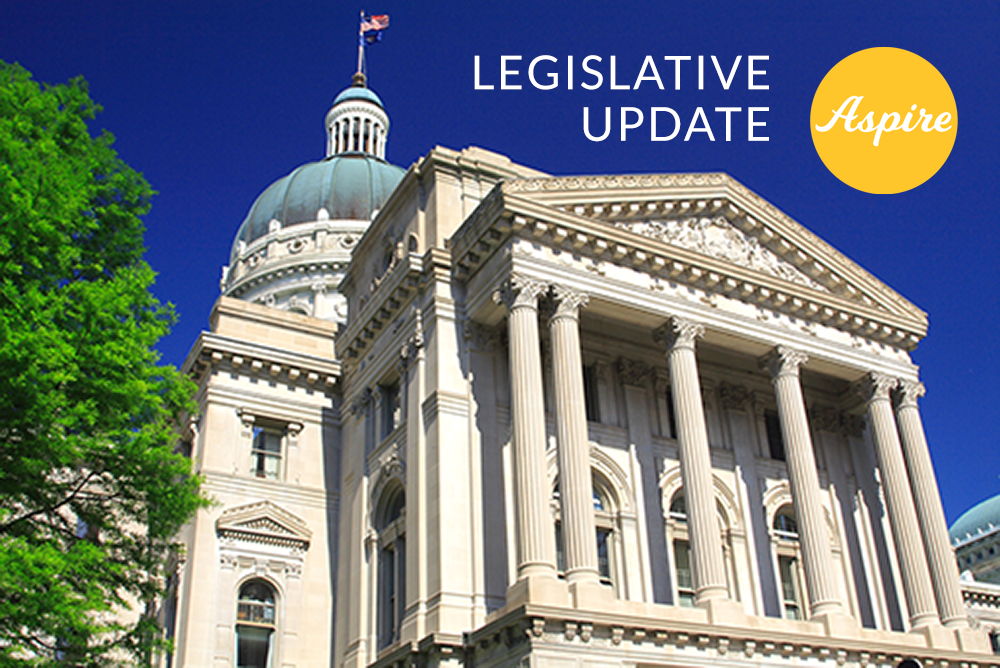Final Week of the 2021 Statehouse Session
Broadband Bills Move to Governor, Budget Forecast Higher Than Expected

This is the final week for the 2021 legislative session. The Second and Third Reading Deadlines (in both the House and the Senate) were last Monday and Tuesday, respectively. The legislature is now fully focused on reconciling differences in bills, as the chambers either agree to each other’s changes on bills or work to reconcile disagreements in conference committees.
And while there are several bills yet to be finalized, many await the Governor’s signature. You can see the list of bills already sent to the Governor and their corresponding signature deadline at the State’s bill watch site here.
We anticipate some late-night sessions this week. Speaker of the House Todd Huston has forewarned folks we may not finish by Wednesday evening, so Aspire is clearing our Thursday calendars.
Here are some major updates, beginning with a few matters Aspire has been working.
Applying the Tobacco Tax to e-Cigarettes
The Senate made a slight change to the wording in the budget on second reading, changing “e-cigarette” to “cartridge.” The tax rates remain unchanged in the Senate’s version of the budget, but the bill has started the conference committee process. There is a chance that e-cigarettes may still yet get taxed the same as other tobacco products, at 24% of wholesale rate.
Late Amendment Threatens Transit Funding
Although SB 141, which would have reversed years of transit planning and withheld voter-approved local income tax, died in the House. However, the bill’s author, Senator Freeman, proposed an amendment to HB 1191 (a utilities bill) that would require IndyGo to pay utility companies for costs incurred to relocate utilities for a transportation public works project involving future rapid transit line AND retroactively to 2017 for the completed Red Line. The motion was challenged for germaneness, meaning that it might not deal with subject matter close enough to the original bill. The Senate legal team determined that the amendment was indeed germane, and the amendment was adopted. Sadly, the bill passed through the Senate on third reading 33-16. Negotiations took place over the weekend and the conference committee met yesterday. Aspire stayed engaged with legislators to share our position.
Broadband Bills Headed to the Governor
The House voted to concur with the Senate’s amendments to HB 1449, Representative Ed Soliday’s bill concerning how broadband projects are funded, with a vote of 92-2. The Senate voted unanimously to concur with the House’s amendments to SB 352, Senator Houchin’s (R-Salem) bill dealing with OCRA’s grant process and INDOT right of ways. SB 359, Senator Scott Baldwin’s (R-Noblesville) bill which would require INDOT to establish a broadband corridor program (aka dig once program), has been returned to the Senate with amendments. And Senator Zay’s (R-Huntington) SB 377 passed through the House 89-2. Senator Zay has filed a motion to concur with the House’s amendments. This bill establishes a portal for reporting lack of broadband access and creating better mapping of exiting service.
State Revenue Forecast Better Than Expected
On Thursday, the state tax revenue forecast was released, prompting optimism about the state’s economy post-pandemic. The forecast projects tax collections going up by more than 4% in each of the next two years. That could mean about $2 billion more available for the new two-year state budget after the last forecast in December projected growth between 2% and 3%. You can read a statement from Representative Tim Brown (the Chairman of House Ways and Means Committee and author of the budget bill) here, and a statement from Senator Ryan Mishler (Chair of the Senate Appropriations Committee) here. What does this all mean? It means that there is a LOT more money to spend than anticipated, so the budget will be worked on over the weekend and many are hoping that their requests will be fully funded.
Governor Holcomb Vetoes HB 1123, House and Senate Override Veto
As he said he would weeks ago, Governor Holcomb has vetoed HB 1123, the bill that would allow the legislature to call themselves into emergency sessions. He has cited concerns over the constitutionality of the bill. The House and the Senate already voted to override his veto last week, with votes of 59-26 and 36-8, respectively. The conflict likely will have to be settled in court, though the Governor has not said whether he will ask for a judicial review of the new law.
